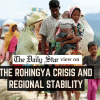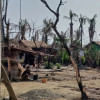No room for a quick fix
Canada's special envoy on the Rohingya crisis Bob Rae has said it would be “unconscionable” for the UN member states to sanction a repatriation that was forced, or that did not include basic protections of human security and human rights.
“This is not a short term problem with a quick fix. The fact that an agreement has been signed between the governments of Bangladesh and Myanmar is a first step in a possible process of repatriation,” he said in a report.
There are several additional assurances and guarantees that have to be provided before such an agreement could be implemented, he added.
The envoy said words were inadequate to express the extent of the damage and trauma being suffered by Rohingya women and girls.
“The condition of women and girls is of particular concern. There is clear evidence of sexual trauma, and a focused effort to deal with this issue is required....
“My own interviews with a group of women were a detailed and graphic account of abuse and violence, including sexual violence as a weapon of war. These allegations of crimes against humanity need to be addressed directly by the international community, and there is a need for post-traumatic measures to help those who survived this ordeal,” reads his six-page report.
Canadian Prime Minister Justin Trudeau appointed Bob as a special envoy on October 23. Since then he has travelled to Indonesia, Bangladesh, Myanmar, Vietnam and the UN in New York and have had discussions with officials, leaders, and NGOs in those countries as well as in Ottawa.
Bob said there was the challenge of resources at the border assessing re-admittance, as well as the conditions that await the returnees in Rakhine State. “The issues of political participation and citizenship loom large over the whole picture.”
Bob said additional resources would need to be gathered to make sure the response was adequate to deal with the extent of the abuse and its consequences.
He hoped that he would be able to see Rakhine first hand, and return to Cox's Bazar to see how conditions were evolving, as well as to have further talks with officials in Myanmar, Bangladesh and international organisations.
Referring to his discussions with officials, leaders and NGOs, Bob said, “These discussions will continue. I shall be travelling again to the region in the New Year, and will issue a final report with recommendations after my return.”
His initial findings are divided into three parts: first, the humanitarian crisis in both Bangladesh and Myanmar as a result of the recent exodus of over 655,000 Rohingyas into Bangladesh, adding to the hundreds of thousands of refugees already in Bangladesh and the 120,000 in camps under virtual lockdown in Rakhine.
Second, the efforts required to ensure the secure return of refugees to their homes with full political and social rights, as well as to ensure the implementation of the recommendations of the Kofi Annan-led Advisory Commission on Rakhine State.
Thirdly, the report highlighted the need to ensure that the substantial evidence of breaches of law and human rights is investigated and assessed in a credible fashion.

 For all latest news, follow The Daily Star's Google News channel.
For all latest news, follow The Daily Star's Google News channel. 








Comments